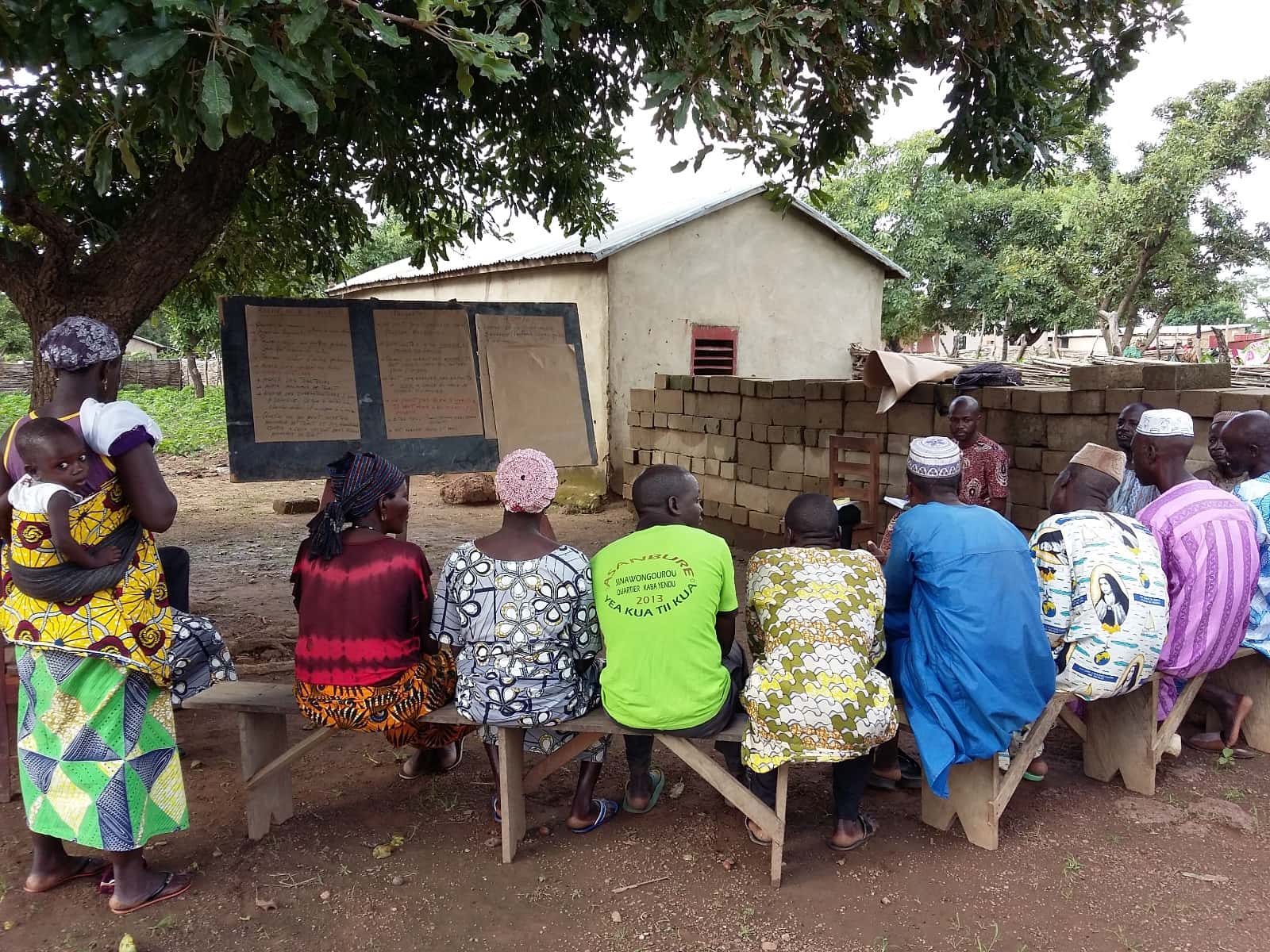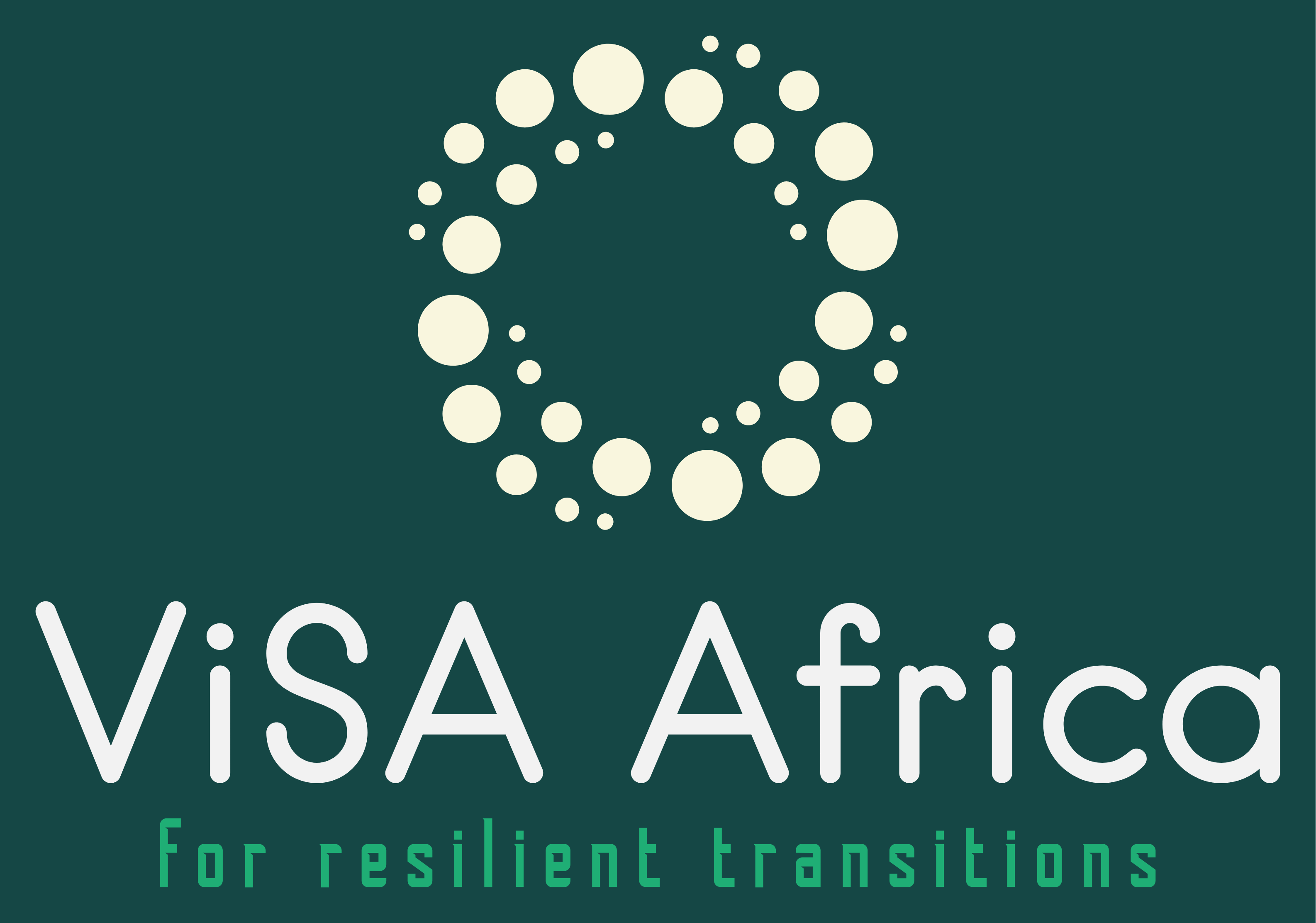
Vision for Sustainability and Climate Adaptation in Africa (ViSA Africa)
Our motivation
Since 2015, the founding members of the NGO ViSA Africa have been working with research and development projects and programmes funded by international partners in Benin in key research and development areas, including responsible land governance, the promotion of communities' legitimate rights, the fight against socio-economic inequalities and the promotion of gender, sustainable land management, food system transformations, and community adaptation and resilience to climate change. With a view to sustainability and synergy of effort and experience, they have decided to join forces and create a Non-Governmental Organisation (NGO) to pursue their ambitions within a more sustainable and appropriate framework.
Identity and Symbol
Vision for Sustainability and Climate Adaptation in Africa (ViSA Africa) is a social engineering organisation focused on systems transformation, environmental sustainability and the protection of communities' legitimate land rights.

ViSA Africa is symbolised by a green background colour with a blue tinge, on which the organisation's logo, name and slogan are set.
The blue-green background symbolises the sustainability to which the NGO's founders aspire. It is also a reminder that green and water are not isolated entities. They are closely linked. The colour green represents greenery (nature, forest, agroecology, etc.). The colour blue represents water, and is a reminder of the need to protect the planet's climate and water resources.
The logo, made up of four series of nine interconnected dots giving the illusion of two interconnected spiral rings, symbolises our desire to connect different points of view to create models on which we can build together. It's also a call to look beyond the dots and silos. Taken individually, all we see are isolated points with little meaning. Taken together, we see coherent images and models.
The organisation's slogan is ‘For resilient transitions’. It sums up ViSA Africa's struggle.
Mission and Values
Vision
ViSA AFRICA's vision is of a peaceful society, free from discrimination and social injustice, where people live in harmony with nature, which provides them with the ecosystem services on which they depend, and which each member of society protects through proactive, coordinated action for the well-being of all and of future generations.
Mission and objectives
ViSA AFRICA's mission is to support populations, especially the most vulnerable, in their transition to sustainable, environmentally-friendly food production systems and to strengthen their capacity to adapt to the effects of climate change, while ensuring that the socio-cultural, economic and political balances essential to national cohesion are maintained. To achieve this, ViSA AFRICA has set itself the following objectives:
- Reduce inequalities and social injustices and other forms of discrimination suffered by communities in their access to land and related resources (water, grazing, timber and non-timber forest products, etc.) on which they depend for their survival and socio-economic well-being.
- To support and encourage both rural and urban populations to make a just transition from current production methods to sustainable food systems that respect the environment and climate.
- Promote innovations and initiatives to better reconcile responsible land governance policies with natural resource conservation policies.
- To initiate and support multi-stakeholder reflection and coordinated and concerted action at local, national, regional and international levels for the development and implementation of fair and equitable policies that guarantee the human rights of populations, especially the most disadvantaged.
Strategy and pillars of intervention
At the heart of ViSA AFRICA's interventions are the communities and sections of the population that are often left behind, including women, young people, migrants, pastoralist communities and, by extension, all socio-community sections whose lives and cultural, social and economic identities or livelihoods are threatened by some form of social injustice linked to access to and control over land and related natural resources, including forests, surface water, grazing land, etc. The intervention strategy is to support the current livelihood needs of these communities and to help them better prepare for and adapt to the multiple and complex crises that we are facing.
The intervention strategy is to support the current livelihood needs of these communities and to help them better prepare for and adapt to the multiple and complex crises we face, including climate change, political conflict and violent extremism. It also means ensuring that the development options and the individual and collective choices people make to meet their subsistence needs and well-being are sustainable and respectful of resource conservation policies as defined by the State and its devolved structures at local and regional level.
To achieve this, ViSA Africa proceeds by :
- Research-Action: Collecting the data and evidence needed to make informed decisions. This research will focus on the socio-agronomic knowledge of communities, the current agronomic, environmental and digital opportunities to support the transition to sustainable systems, and the disparities and social injustices likely to hinder equitable access to land and resources.
- Organising or strengthening community structures and institutions: Ensuring that solutions are endogenous and contextual and that the foundations on which they are built are sustainable.
- Capacity building and mutual learning: By recognising and making the most of existing knowledge and capacities, analysing new needs in terms of capacities and skills in the light of current and future challenges and making joint and concerted decisions on efficient capacity building strategies and approaches that guarantee a multiplier effect of the benefits linked to the new capacities and skills for the target populations.
- Stimulating or supporting agricultural and environmental innovations: By developing and facilitating appropriate frameworks for exchange and co-construction where new transformative ideas are tested with the aim of overcoming current constraints and challenges and improving people's well-being.
- Responsible and transparent political and operational communication: Through sustained documentation of the organisation's actions and decisions, a coordinated communications policy based on data and the courage to serve the causes of communities and denounce the social injustices they face at the level of national and international bodies and platforms.
- Inclusion and balance of power: By effectively combating social injustices and putting in place tools and mechanisms for resolving conflicts and asserting communities' legitimate rights to the resources on which they depend.
- Strategic partnership: By identifying stakeholders who can support or potentially affect the organisation's actions in order to explore opportunities for collaboration and synergy, or to better coordinate interventions in the field or as part of participatory advocacy.
Values and Principles
The life and work of ViSA Africa are based on the following values and principles:
- Transparency: ViSA Africa will provide each member of staff, whatever their level in the hierarchy, with access to all the strategic and operational information they need not only to carry out their tasks and responsibilities, but also to better understand the culture, functioning and managerial direction of the organisation.
- Responsibility / Accountability: Each member of ViSA is responsible for strict compliance with the organisation's code of ethics, including ensuring and facilitating accountability. ViSA undertakes to comply scrupulously with the laws and regulations governing associations, finance and the economy in the country in which it operates, and to make its management tools and documents public for the purposes of audits and other investigations or consultations.
- Participative leadership: ViSA Africa values and implements participative leadership to intentionally and effectively involve all staff members in decision-making, strengthen their sense of belonging to the organisation, and reinforce synergies between the career objectives of staff and those of the organisation.
- Fairness, inclusion and diversity: For ViSA Africa, the plurality of personalities, cultures, gender backgrounds and professional and personal experiences provide opportunities for exchange, mutual learning and, above all, an opening onto the world and other horizons. This diversity of points of view strengthens us, improves our ability to debate and challenge ourselves, and stimulates the emergence of new, innovative and creative ideas.
- Non-discrimination: ViSA is an organisation of equal opportunity for everyone and tolerates no form of exclusion or discrimination whatsoever.